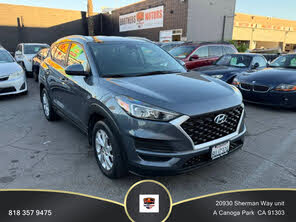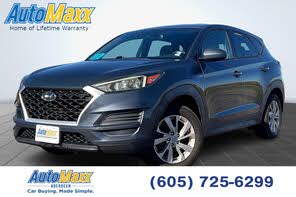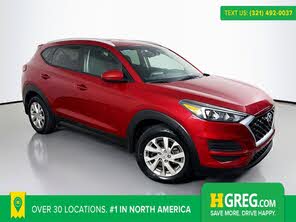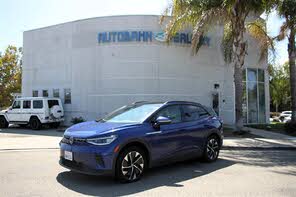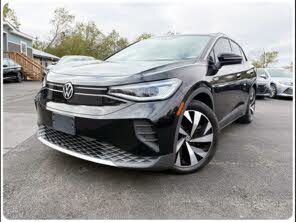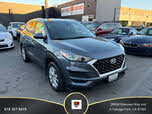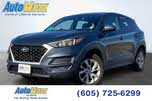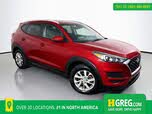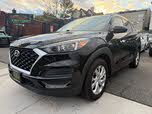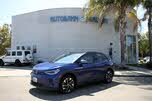2021 Hyundai Tucson vs 2021 Volkswagen ID.4
Overview | |
MSRP$23,700 | MSRP$39,995 |
Listings682 | Listings396 |
Ratings & Reviews | |
User Reviews | User Reviews |
Expert reviews7.7 out of 10 | Expert reviews7.3 out of 10 |
Pros
Cons
| Pros
Cons
|
2021 Hyundai Tucson Reviews SummaryIt’s no secret that small SUVs are among the most popular new-car segments. You see them everywhere on the road today. Automakers put a lot of pressure on themselves to continually offer the latest and greatest. But that also means even the not-so-new are still terrific vehicles and provide a great value. Case in point: the 2021 Hyundai Tucson. The current generation of this compact SUV was introduced for the 2016 model year, and this 2021 edition represents the final model year before a new generation is ushered in. So why go with the older model? Because Hyundai has loaded it up with plenty of tech and safety features and it is offered at a competitive price. | |
2021 Volkswagen ID.4 Reviews SummaryThe “Dieselgate” emissions scandal forced Volkswagen to double down on electric cars, and now we’re finally seeing the first result of that: the 2021 Volkswagen ID.4 electric crossover. VW has made an electric car before, but its last attempt, the e-Golf, was built to satisfy emissions standards, not rack up sales. It was barely advertised, and it was sold only in certain states. That’s not the case with the ID.4, which will be available nationwide and will even be built in Tennessee starting in 2022. Volkswagen views the ID.4 as a rival not to other EVs, but to mainstream gasoline vehicles like the Honda CR-V and Toyota RAV4. Being late to the party means there are already several other EVs trying to coax new-car buyers away from internal combustion, however. If you want a reasonably-priced EV, the Nissan Leaf, Hyundai Kona Electric, and Kia Niro EV already exist, and General Motors just announced the 2022 Chevrolet Bolt EUV—a new variant of the Chevy Bolt EV with a crossover body style similar to the Volkswagen. We tested an ID.4 1st Edition, which commemorates the car’s launch, and an ID.4 PRO S with all-wheel drive (AWD). The 1st Edition is a limited-edition model that has already sold out, but it’s mechanically identical to the ID.4 Pro S AWD, albeit with power sent only to the rear wheels. | |
No video found | |
Popular Features & Specs | |
Engine2.0L 161 hp I4 | Engine201 hp Electric |
Drive TrainFWD | Drive TrainRWD |
Seating Capacity5 | Seating Capacity5 |
Horsepower161 hp @ 6200 rpm | Horsepower |
EV Battery Capacity | EV Battery Capacity82 kWh |
MPG City23 | MPG City104 |
MPG Highway28 | MPG Highway89 |
Battery Charge Time (240V) | Battery Charge Time (240V)8 hours |
Engine | |
Engine Name2.0L 161 hp I4 | Engine Name201 hp Electric |
Torque150 lb-ft @ 4700 rpm | Torque |
Horsepower161 hp @ 6200 rpm | Horsepower |
Battery Charge Time (240V) | Battery Charge Time (240V)8 hours |
DrivetrainFWD | DrivetrainRWD |
Fuel Economy | |
EV Battery Capacity | EV Battery Capacity82 kWh |
MPG City23 | MPG City104 |
MPG Highway28 | MPG Highway89 |
Interior | |
Seating Capacity5 | Seating Capacity5 |
Safety | |
Front Crash Overall5 | Front Crash Overall5 |
Side Crash Overall5 | Side Crash Overall5 |
Dimensions & Capacity | |
Cargo Space31.0 cu ft | Cargo Space30.3 cu ft |
Curb Weight3309 lbs | Curb Weight4517 lbs |
Height64.8 in | Height64.4 in |
Length176.4 in | Length180.5 in |
Width72.8 in | Width72.9 in |
Wheelbase105.1 in | Wheelbase108.9 in |
Maximum Payload1146 lbs | Maximum Payload1347 lbs |
Number of doors4 | Number of doors4 |
Maximum Towing Capacity1500 lbs | Maximum Towing Capacity |
Overview | ||
MSRP | $23,700 | $39,995 |
Listings | ||
Ratings & Reviews | ||
User reviews | ||
Expert reviews | 7.7 out of 10Read full review | 7.3 out of 10Read full review |
Pros & cons | Pros
Cons
| Pros
Cons
|
Summary | It’s no secret that small SUVs are among the most popular new-car segments. You see them everywhere on the road today. Automakers put a lot of pressure on themselves to continually offer the latest and greatest. But that also means even the not-so-new are still terrific vehicles and provide a great value. Case in point: the 2021 Hyundai Tucson. The current generation of this compact SUV was introduced for the 2016 model year, and this 2021 edition represents the final model year before a new generation is ushered in. So why go with the older model? Because Hyundai has loaded it up with plenty of tech and safety features and it is offered at a competitive price. | The “Dieselgate” emissions scandal forced Volkswagen to double down on electric cars, and now we’re finally seeing the first result of that: the 2021 Volkswagen ID.4 electric crossover. VW has made an electric car before, but its last attempt, the e-Golf, was built to satisfy emissions standards, not rack up sales. It was barely advertised, and it was sold only in certain states. That’s not the case with the ID.4, which will be available nationwide and will even be built in Tennessee starting in 2022. Volkswagen views the ID.4 as a rival not to other EVs, but to mainstream gasoline vehicles like the Honda CR-V and Toyota RAV4. Being late to the party means there are already several other EVs trying to coax new-car buyers away from internal combustion, however. If you want a reasonably-priced EV, the Nissan Leaf, Hyundai Kona Electric, and Kia Niro EV already exist, and General Motors just announced the 2022 Chevrolet Bolt EUV—a new variant of the Chevy Bolt EV with a crossover body style similar to the Volkswagen. We tested an ID.4 1st Edition, which commemorates the car’s launch, and an ID.4 PRO S with all-wheel drive (AWD). The 1st Edition is a limited-edition model that has already sold out, but it’s mechanically identical to the ID.4 Pro S AWD, albeit with power sent only to the rear wheels. |
Video | No video found | |
Popular Features & Specs | ||
Engine | 2.0L 161 hp I4 | 201 hp Electric |
Drive Train | FWD | RWD |
Seating Capacity | 5 | 5 |
Horsepower | 161 hp @ 6200 rpm | |
EV Battery Capacity | 82 kWh | |
MPG City | 23 | 104 |
MPG Highway | 28 | 89 |
Battery Charge Time (240V) | 8 hours | |
Engine | ||
Engine Name | 2.0L 161 hp I4 | 201 hp Electric |
Torque | 150 lb-ft @ 4700 rpm | |
Horsepower | 161 hp @ 6200 rpm | |
Battery Charge Time (240V) | 8 hours | |
Drivetrain | FWD | RWD |
Fuel Economy | ||
EV Battery Capacity | 82 kWh | |
MPG City | 23 | 104 |
MPG Highway | 28 | 89 |
Interior | ||
Seating Capacity | 5 | 5 |
Safety | ||
Front Crash Overall | 5 | 5 |
Side Crash Overall | 5 | 5 |
Dimensions & Capacity | ||
Cargo Space | 31.0 cu ft | 30.3 cu ft |
Curb Weight | 3309 lbs | 4517 lbs |
Height | 64.8 in | 64.4 in |
Length | 176.4 in | 180.5 in |
Width | 72.8 in | 72.9 in |
Wheelbase | 105.1 in | 108.9 in |
Maximum Payload | 1146 lbs | 1347 lbs |
Number of doors | 4 | 4 |
Maximum Towing Capacity | 1500 lbs | |
The 2021 Hyundai Tucson featured a more futuristic design, appealing to those who preferred a small crossover with conventional styling. Its upright layout provided a commanding view of the road, and the interior boasted a modern, attractive dash design. Tech features were seamlessly integrated into the overall aesthetic, with every button and dial easy to locate.
Trim levels for the 2021 Tucson included SE, Value, SEL, Sport, Limited, and Ultimate. The base SE trim came with 17-inch alloy wheels, manually adjustable front seats, a digital driver information display, and a 7-inch touchscreen infotainment system with Apple CarPlay and Android Auto. Higher trims added features like LED headlight accents, heated side mirrors, roof rails, power-adjustable seats, and more advanced tech and comfort options.
The 2021 Volkswagen ID.4 was designed from the ground up as an EV, showcasing a distinctive look that set it apart from Volkswagen’s gasoline models. It replaced straight lines and sharp angles with a streamlined profile and wheels pushed out to the corners of the body. The ID.4 was part of VW’s EV-specific MEB platform, following the European-market ID.3 hatchback.
The interior design of the ID.4 blended Volkswagen’s trademark minimalism with a smartphone aesthetic, featuring piano black and matte plastic elements. The base ID.4 Pro came with a leather-wrapped steering wheel and cloth seats, while the Pro S and 1st Edition models offered leatherette upholstery. The cabin felt spacious, with good forward visibility, although rearward visibility was hindered by thick rear pillars and a small back window.

















The 2021 Hyundai Tucson offered two engine options. The base engine was a 2.0-liter four-cylinder producing 161 horsepower and 150 pound-feet of torque. The SEL, Sport, Limited, and Ultimate trims came with a 2.4-liter four-cylinder engine delivering 181 horsepower and 175 pound-feet of torque. Both engines were paired with a six-speed automatic transmission and offered standard front-wheel drive (FWD) or optional all-wheel drive (AWD). The base engine felt underwhelming, especially at highway speeds, while the 2.4-liter engine provided a livelier performance around town. The Tucson had a comfortable, refined ride, striking a balance between softness and athleticism. Towing capacity was 1,500 pounds with the base engine and 2,000 pounds with the 2.4-liter engine.
At launch, the 2021 Volkswagen ID.4 was available with a single rear-mounted electric motor producing 201 horsepower and 229 pound-feet of torque, powered by an 82-kilowatt-hour battery pack. It was the first rear-wheel drive (RWD) Volkswagen passenger car sold in the United States since the Beetle. An all-wheel-drive (AWD) version, with a second electric motor powering the front wheels, arrived later in 2021, boosting power output to 295 horsepower and 339 pound-feet of torque. The ID.4’s RWD setup provided balanced handling, while the AWD version offered increased power and traction. The ID.4 was tuned for comfort rather than sporty handling, with a smooth ride over bumps and potholes. Unlike many EVs, the ID.4 did not offer aggressive regenerative braking for one-pedal driving, opting instead for a more traditional driving experience.
The 2021 Hyundai Tucson provided 31 cubic feet of cargo space behind the rear seats, expanding to 61.9 cubic feet with the rear seats folded. While this was on the lower side for the compact SUV segment, it offered adequate space for weekend bags or large boxes. Higher trims, like the Sport, included a hands-free power liftgate. The Tucson’s front seats offered solid headroom and legroom, with comfortable and supportive seating even on long trips. The rear seats were less spacious but still accommodating for adults on road trips. The cabin featured plenty of cubbies and compartments for storage.
The 2021 Volkswagen ID.4 offered 30.3 cubic feet of cargo space with the rear seats in place, expanding to 64.2 cubic feet with the rear seats folded. This was more than competitors like the Nissan Leaf, Hyundai Kona Electric, and Kia Niro EV, but less than gasoline crossovers like the Honda CR-V and Toyota RAV4. The ID.4 did not have a front trunk (frunk), opting instead to maximize cabin space. The interior felt spacious from the driver’s seat, with good forward visibility but subpar rearward visibility due to thick rear pillars and a small back window. The ID.4 featured a unique twist-grip gear selector on the dashboard, freeing up space on the center console, although the console itself was narrow and close to the floor, limiting storage for larger items.
The 2021 Hyundai Tucson came standard with a 7-inch touchscreen infotainment system with Apple CarPlay and Android Auto. The Ultimate trim featured an upgraded 8-inch touchscreen, which was optional on other trims. The touchscreen was user-friendly, with logical menu layouts and helpful hard buttons. Additional available features included navigation, satellite radio, and wireless device charging.
The 2021 Volkswagen ID.4’s standard infotainment system included a 10-inch touchscreen, with a 12-inch screen optional. It featured wireless Apple CarPlay and Android Auto, a 5.3-inch display screen for the instrument cluster, and haptic touchpads in place of traditional switchgear. While the setup looked modern, it was difficult to use due to the lack of tactile feedback from the touchpads. The ID.4 also included a natural-language voice-control system, responding to the prompt “Hello ID,” although it was slow to respond. The ID.Light, a light strip at the base of the windshield, communicated information to the driver but was more of a novelty than a useful feature. Despite these quirks, the touchscreen was well-positioned with smart-looking graphics and easy-to-navigate menus.
The 2021 Hyundai Tucson offered a solid list of standard driver-assistance features, including automatic emergency braking, forward collision warning, lane departure warning, lane-keeping assist, and driver drowsiness monitoring. Higher trims added features like adaptive cruise control, pedestrian detection, automatic high-beams, a 360-degree parking monitor, and blind-spot monitoring. The Tucson earned five out of five stars from the National Highway Traffic Safety Administration (NHTSA) and a "Top Safety Pick" rating from the Insurance Institute for Highway Safety (IIHS).
The 2021 Volkswagen ID.4 received the highest-level Top Safety Pick+ designation from the IIHS and five out of five stars from the NHTSA for the RWD model. The AWD model had not been tested by the NHTSA. Standard driver aids included forward-collision warning, automatic emergency braking, blind-spot monitoring, lane-keep assist, park distance control, automatic high beams, and adaptive cruise control. New for 2021 were Travel Assist, which added automated lane centering to adaptive cruise control, and Emergency Assist, designed to bring the car to a stop if the driver was incapacitated. Travel Assist performed well, smoothly following curves and responding well to acceleration and deceleration.
CarGurus highlights

According to CarGurus experts, the overall rating for the 2021 Hyundai Tucson is 7.7 out of 10, while the 2021 Volkswagen ID.4 scores 7.3 out of 10. Based on these ratings, the 2021 Hyundai Tucson is the recommended choice, offering a better overall package with its conventional design, comfortable ride, and strong safety features.
Choose the 2021 Hyundai Tucson if:
- You prefer a conventional, yet modern design with easy-to-use tech features.
- You need a comfortable ride with adequate cargo space for everyday use.
- You value a strong list of standard safety features and top safety ratings.
Choose the 2021 Volkswagen ID.4 if:
- You want a distinctive, all-electric vehicle with a spacious interior.
- You appreciate advanced tech features like a large touchscreen and natural-language voice control.
- You seek a comfortable ride with balanced handling and good safety ratings.
CarGurus highlights

According to CarGurus experts, the overall rating for the 2021 Hyundai Tucson is 7.7 out of 10, while the 2021 Volkswagen ID.4 scores 7.3 out of 10. Based on these ratings, the 2021 Hyundai Tucson is the recommended choice, offering a better overall package with its conventional design, comfortable ride, and strong safety features.
Choose the 2021 Hyundai Tucson if:
Shop Now- You prefer a conventional, yet modern design with easy-to-use tech features.
- You need a comfortable ride with adequate cargo space for everyday use.
- You value a strong list of standard safety features and top safety ratings.
Choose the 2021 Volkswagen ID.4 if:
Shop Now- You want a distinctive, all-electric vehicle with a spacious interior.
- You appreciate advanced tech features like a large touchscreen and natural-language voice control.
- You seek a comfortable ride with balanced handling and good safety ratings.

By: CarGurus + AI
At CarGurus, our team of experienced automotive writers remain at the heart of our content operation, conducting hands-on car tests and writing insightful guides that are backed by years of industry experience. To complement this, we are harnessing AI to make our content offering more diverse and more helpful to shoppers than ever. To achieve this, our AI systems are based exclusively on CarGurus content, ratings and data, so that what we produce is both unique to CarGurus, and uniquely helpful to car shoppers.

